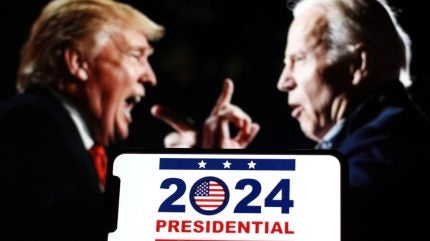
The first televised debate, which took place on Thursday 27 June has led to both US presidential candidate’s characters being examined and criticised.
Gherzi Textil Organisation partner Robert P Antoshak tells Just Style: “A low bar was set for the debate, as drama overshadowed the substance.”
He adds that initial polling suggests many Americans think Biden lost, but it’s unclear whether Trump won: “Biden may be showing his age, but Trump showcased his propensity to spout fiction and messaging that stoked his most ardent supporters.”
Antoshak believes it has added confusion without providing precise policy positions.
Plus, it has led to calls for Biden to leave the election race altogether before his party’s national convention.
This, Antoshak notes, leads to more questions than answers around potential Democratic nominees and their ability to compete against Trump, which compounds to both the political uncertainty and the uncertainty for the apparel sector at large.

US Tariffs are shifting - will you react or anticipate?
Don’t let policy changes catch you off guard. Stay proactive with real-time data and expert analysis.
By GlobalDataIf the general character assassinations and bickering are taken to one side, the key question remains: How will the policies discussed during the debate impact the global fashion supply chain in five months’ time?
US presidency debate reveals concerns over US-China relationship
Professor of apparel studies at the University of Delaware Dr Sheng Lu shares that both Biden and Trump regard China as a strategic competitor and threat to US national security.
He highlights that regardless of the next US president, the US-China bilateral relationship could become even more contentious and confrontational in the coming years.
Thus, he states: “US fashion companies may find it imperative to continue reducing their exposure to China and actively exploring alternative sourcing and supply chain options.”
What will be the status quo on tariffs?
The American Apparel & Footwear Association (AAFA)’s president Steve Lamar tells Just Style exclusively that “regrettably” both candidates have embraced the status quo on tariffs, which he describes as a “very regressive and misogynistic tool.”
Lamar shares the debate doubled down on that “tired approach to trade policy,” before adding: “The cost of shoes, clothes, backpacks, and other basics should not rise disproportionately for females and low-income Americans as it does with the current tariff approach.”
He also notes the US has not seen this kind of sustained increase in apparel and footwear prices in decades.
The AAFA asserts that Americans need to see a more positive and predictable approach that incentivises smart trade, supports investment, and invigorates competition.
Lu is particularly concerned about Trump’s threat to impose a global tariff on imports from all sources, which he says could potentially exacerbate the inflation problem and cause new market panic.
Meanwhile, Antoshak argues the lack of substantial insight on trade policies that would affect the apparel industry, such as Trump’s proposed across-the-board tariff hikes, leaves the sector with “significant uncertainty”.
Tackling climate change and prioritising sustainability
Climate change and tackling sustainability is a topic of high concern for the global apparel industry.
Lu makes the point that US fashion companies have been looking forward to more direct policy support in making, trading, and consuming sustainable apparel products.
He says Biden’s trade policy significantly emphasises addressing climate change and promoting sustainability.
On the other hand, he continues: “Trump is not known as a strong supporter of addressing climate change, he is more supportive of reducing regulations to create a more business-friendly environment.”
Lu suggests this could offer fashion companies more operational efficiency to carry out their own sustainability efforts.
Ongoing global socio-economic challenges
Regardless of who becomes the next president, Lu is keen to remind the global apparel sector that US fashion companies will continue to face a highly uncertain world from the US economy and trade war to geopolitical tensions.
He also admits that while the Biden administration struggled to bring high inflation down, which has held consumers back on clothing spending, Trump hasn’t offered a credible quick solution to the issue either.”
Overall impact of most likely next US president?
GlobalData’s retail analyst Neil Saunders takes an early punt and suggests the “debate makes it more likely, but far from certain, that Trump will win come November”.
He tells Just Style that this would bring good and bad news for the apparel sector.
The good news, he says is that Trump is likely to be more generous with tax cuts and keeping taxes low, which will boost discretionary spending over the medium term.
The bad news, however “is that Trump could be more aggressive on tariffs which could push up the cost of some apparel”.



